 Melancholic - that's the first word that came to my mind when I finished this book. I'm guessing that's how Helen, the protagonist, felt for a major part of her adult life. Her husband, Cal, had been on the Ocean Ranger that sunk in 1982, off the coast of Newfoundland - there were no survivors.
Fast-forward to 2008, which is when this book starts: Helen, now a middle-aged woman, is battling loneliness and misery, as she tries to find some kind of solace in looking after the grandchildren and sewing beautiful wedding and prom dresses as a career. She's tried her hand at online dating, after being persuaded by the children; she's tried yoga; working in a corporation and all in all, it just sounds like she's tried a myriad of things to get over the grief - but to no avail. Does one ever actually get over losing a loved one?
Melancholic - that's the first word that came to my mind when I finished this book. I'm guessing that's how Helen, the protagonist, felt for a major part of her adult life. Her husband, Cal, had been on the Ocean Ranger that sunk in 1982, off the coast of Newfoundland - there were no survivors.
Fast-forward to 2008, which is when this book starts: Helen, now a middle-aged woman, is battling loneliness and misery, as she tries to find some kind of solace in looking after the grandchildren and sewing beautiful wedding and prom dresses as a career. She's tried her hand at online dating, after being persuaded by the children; she's tried yoga; working in a corporation and all in all, it just sounds like she's tried a myriad of things to get over the grief - but to no avail. Does one ever actually get over losing a loved one?
The narration isn't linear though - it's almost like a series of random flashbacks and memories that have made up some of the happiest, saddest and most poignant moments of Helen's life : be it receiving a Valentine's card from her husband, days after the Ocean Ranger sank or, contemplating his last moments - did he at least get to play a last game of cards post-supper?
There is no plot - at least not one that I could find. It was essentially focusing on Helen's despondence, as well as the lives of her children and grandchildren: her daughter getting pregnant at the age of fifteen, her daughter coming home drunk and escorted by the police. It's also a very "twenty-first century" novel, with references to Cosmo and Vogue, eBay and online dating. I'm still not quite accustomed to seeing them in books - even though, for once, it didn't sound like those references were forced. It was just part of the narrative, and it made the book more real somehow.
Did I enjoy this book - not really. It depressed me, and made me ponder on things that I ordinarily wouldn't (e.g. do you ever get over the loss of a loved one, specially a husband?). It was just so - sad, for lack of better words! Well-written, descriptive, emotional, but sad! One of my favourite poems is Dylan Thomas' Death Shall Have No Dominion, but clearly, those left behind beg to differ, as this book reminds us, not very subtly! Who knows how life can change by things we have no control over, when we least expect it to?!
Have you read anything by Lisa Moore? I've heard Alligator is worth a read - would you recommend it?
As for this book being on the Booker longlist - well, I personally don't think it'll make the shortlist, but hey! What do I know?! What do you think - does the shortlist have a place for February?
 I apologise for my thoughts on this book at the very outset. I'm going through a bit of a stressful phase right now, and while normally, it doesn't affect the way I approach books, I'm not completely convinced that it hasn't this time 'round. I mean, The Long Song was longlisted for the Orange Prize, and it's on the Booker longlist as well. It's got to be a good book, right?
Well, I didn't finish it, and it wasn't for lack of trying! I put it aside at 150 pages - my edition had 308 pages, so I did read about half of the book, and it failed to engage me at any level. Strange, because the subject matter is intense and well, more often than not, I end up empathising and sympathising with the protagonists and narrators of such stories. This time - absolutely nothing.
I apologise for my thoughts on this book at the very outset. I'm going through a bit of a stressful phase right now, and while normally, it doesn't affect the way I approach books, I'm not completely convinced that it hasn't this time 'round. I mean, The Long Song was longlisted for the Orange Prize, and it's on the Booker longlist as well. It's got to be a good book, right?
Well, I didn't finish it, and it wasn't for lack of trying! I put it aside at 150 pages - my edition had 308 pages, so I did read about half of the book, and it failed to engage me at any level. Strange, because the subject matter is intense and well, more often than not, I end up empathising and sympathising with the protagonists and narrators of such stories. This time - absolutely nothing. About five years back, with the launch of the iPod Shuffle, Apple declared "random is the new order" to the world, as "life is random" so we should "give chance a chance."
What does any of this have to do with Black Swan Green? Well, nothing, really! However, it does have a lot to do with the way I've approached the works of David Mitchell - Unlike some book bloggers (e.g.
About five years back, with the launch of the iPod Shuffle, Apple declared "random is the new order" to the world, as "life is random" so we should "give chance a chance."
What does any of this have to do with Black Swan Green? Well, nothing, really! However, it does have a lot to do with the way I've approached the works of David Mitchell - Unlike some book bloggers (e.g. 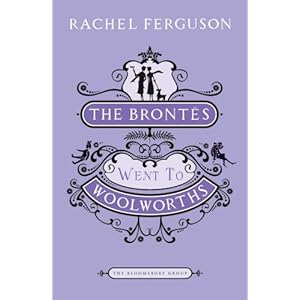 The Brontës Went to Woolworths is one of those utterly bizarre books, with quirky characters and a story which makes the mind boggle. The thin line between fact and fiction is erased by the Carne sisters - the protagonists of this book - as they let their imaginations run away with them, and create a wondrous warm world of friendship, happiness and make-believe. A dog who used to be Pope, a doll who used to live in Paris and friends in high places, including Judge Toddington ("Toddy").
You also have their mother, who indulges them and the prudish governess, Miss Martin, who judges them, as she can't quite fathom what's going on inside the bubble the family has created for themselves, probably to cope with grief and sadness after their father's unfortunate demise. To be fair, one can't really blame Miss Martin for being confused about what's going on in this 1930s household - I was utterly baffled by what was going on for the first fifty odd pages, and I kind-of had an inkling of a clue. However, once I figured out the line that the Carnes had erased, things suddenly became much clearer...
The Brontës Went to Woolworths is one of those utterly bizarre books, with quirky characters and a story which makes the mind boggle. The thin line between fact and fiction is erased by the Carne sisters - the protagonists of this book - as they let their imaginations run away with them, and create a wondrous warm world of friendship, happiness and make-believe. A dog who used to be Pope, a doll who used to live in Paris and friends in high places, including Judge Toddington ("Toddy").
You also have their mother, who indulges them and the prudish governess, Miss Martin, who judges them, as she can't quite fathom what's going on inside the bubble the family has created for themselves, probably to cope with grief and sadness after their father's unfortunate demise. To be fair, one can't really blame Miss Martin for being confused about what's going on in this 1930s household - I was utterly baffled by what was going on for the first fifty odd pages, and I kind-of had an inkling of a clue. However, once I figured out the line that the Carnes had erased, things suddenly became much clearer...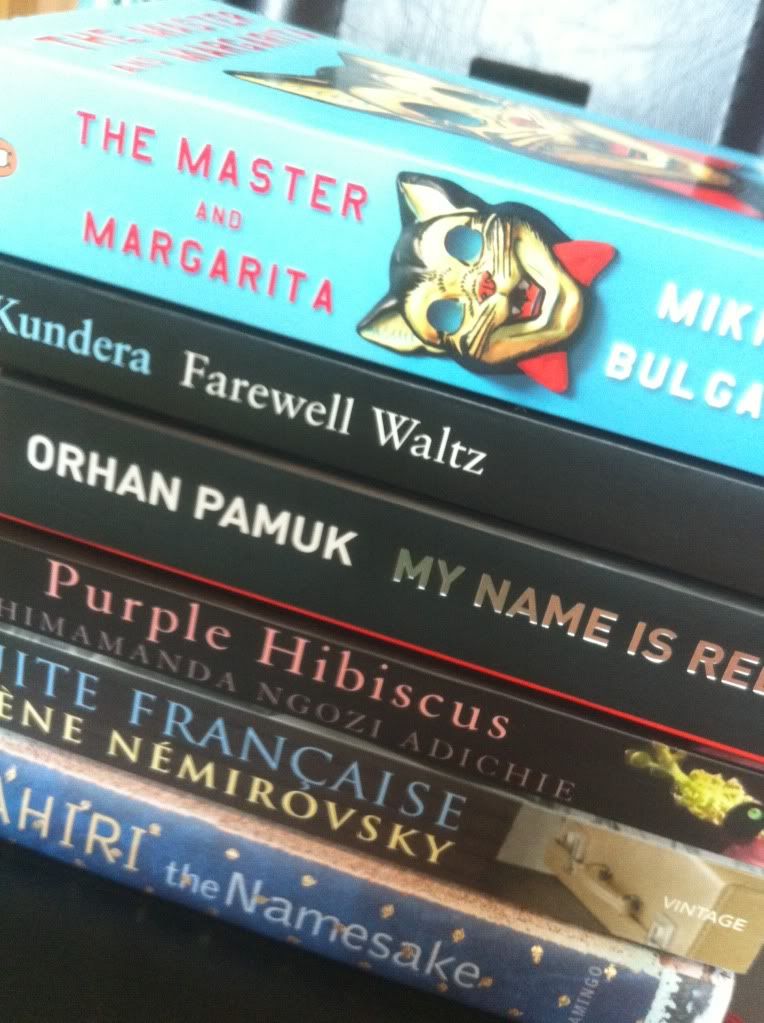
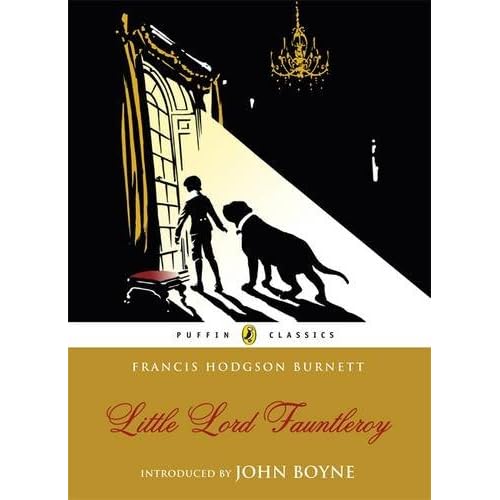 I finally have some semblance of a life again after being under the weather for an extraordinarily long time (well, "extraordinarily long" is a relative term, but it is coming up to about two months now). I read loads of my old Enid Blytons and Nancy Drews, while twiddling my thumbs and imagining all kinds of crazy things, but most of them were being re-read for about the seven hundred and twenty third time. I can actually recite some of those books without any prompts...
Right, that's a long digressive opening paragraph, which is meant to lead up to this simple statement : the only children's book (comfort read) I read during this period which I hadn't read before was Frances Hodgson Burnett's Little Lord Fauntleroy. I absolutely loved both, The Secret Garden and A Little Princess, but I'd just never managed to find this book anywhere before. Hurrah for libraries!
I finally have some semblance of a life again after being under the weather for an extraordinarily long time (well, "extraordinarily long" is a relative term, but it is coming up to about two months now). I read loads of my old Enid Blytons and Nancy Drews, while twiddling my thumbs and imagining all kinds of crazy things, but most of them were being re-read for about the seven hundred and twenty third time. I can actually recite some of those books without any prompts...
Right, that's a long digressive opening paragraph, which is meant to lead up to this simple statement : the only children's book (comfort read) I read during this period which I hadn't read before was Frances Hodgson Burnett's Little Lord Fauntleroy. I absolutely loved both, The Secret Garden and A Little Princess, but I'd just never managed to find this book anywhere before. Hurrah for libraries!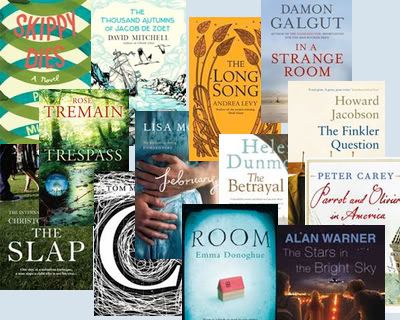
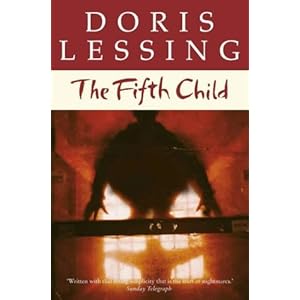 By virtue of Doris Lessing being a Nobel Laureate, her books have always intimidated me. The size of the one book I've heard about the most, The Golden Notebook, hasn't really helped. However, when I stumbled upon The Fifth Child at the library, I felt as though I had to try reading at least one of her books. I've read
By virtue of Doris Lessing being a Nobel Laureate, her books have always intimidated me. The size of the one book I've heard about the most, The Golden Notebook, hasn't really helped. However, when I stumbled upon The Fifth Child at the library, I felt as though I had to try reading at least one of her books. I've read 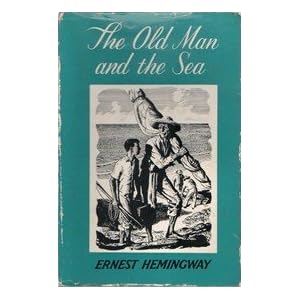 I have an absolutely ancient copy of this book lying around, and it's actually bizarre that I've not read the book yet - it's just 114 pages long! Published in 1974, the book cost just 30p at the time (US$0.45)! The book costs £7.99 now... let's keep that musing for another day!
The Old Man and the Sea is an extremely 'concise' book, for the lack of a better word. The plot is uncomplicated, with minimal dialogue. It's literally about an old man and the sea, as the old man (Santiago) tries to change his luck, after going eighty-four days without catching a fish.
I have an absolutely ancient copy of this book lying around, and it's actually bizarre that I've not read the book yet - it's just 114 pages long! Published in 1974, the book cost just 30p at the time (US$0.45)! The book costs £7.99 now... let's keep that musing for another day!
The Old Man and the Sea is an extremely 'concise' book, for the lack of a better word. The plot is uncomplicated, with minimal dialogue. It's literally about an old man and the sea, as the old man (Santiago) tries to change his luck, after going eighty-four days without catching a fish.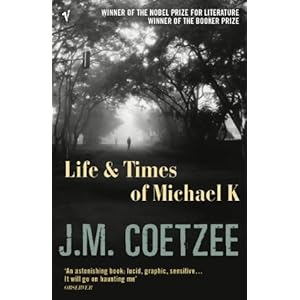 Life and Times of Michael K won the Booker Prize in 1983, and it's been one of Coetzee's books that I've wanted to read for a really long time. The name intrigued me: who is Michael K? And, what is it about his life and times that merits a novel?
Life and Times of Michael K won the Booker Prize in 1983, and it's been one of Coetzee's books that I've wanted to read for a really long time. The name intrigued me: who is Michael K? And, what is it about his life and times that merits a novel?
 I loved The Thorn Birds when I read it, almost ten years ago. Never went near another book by Colleen McCullough after that, as I was scared it would ruin The Thorn Birds for me. However, while browsing around at the library, I saw a fair few books by McCullough, and decided to take the plunge. So happy that I did - I loved this book!
It's a diary of twenty-one year old Harriet Purcell in the 1960s. An X- Ray technician, Harriet's engaged to the boy she's been dating for a long time (but he doesn't even kiss with his mouth open!), and she shares a bedroom with her grandmother.
I loved The Thorn Birds when I read it, almost ten years ago. Never went near another book by Colleen McCullough after that, as I was scared it would ruin The Thorn Birds for me. However, while browsing around at the library, I saw a fair few books by McCullough, and decided to take the plunge. So happy that I did - I loved this book!
It's a diary of twenty-one year old Harriet Purcell in the 1960s. An X- Ray technician, Harriet's engaged to the boy she's been dating for a long time (but he doesn't even kiss with his mouth open!), and she shares a bedroom with her grandmother. Oh, it's been absolutely ages since I've read a 470+ page book in a day, but boy, this one was absolutely worth it. It's been labeled "wicked", "sordid" and even "cheap". I half thought of
Oh, it's been absolutely ages since I've read a 470+ page book in a day, but boy, this one was absolutely worth it. It's been labeled "wicked", "sordid" and even "cheap". I half thought of